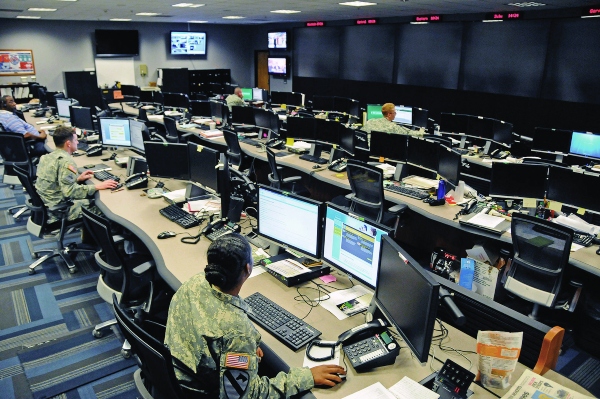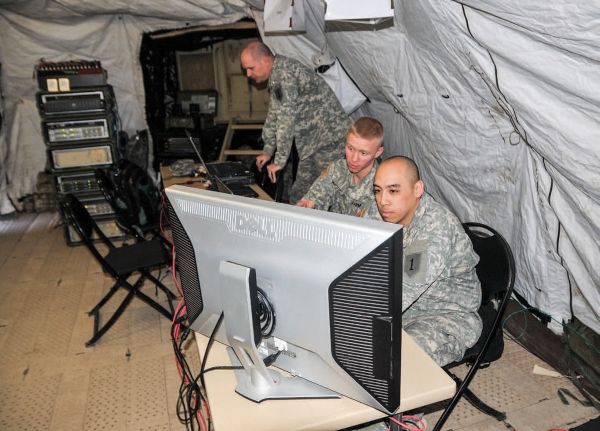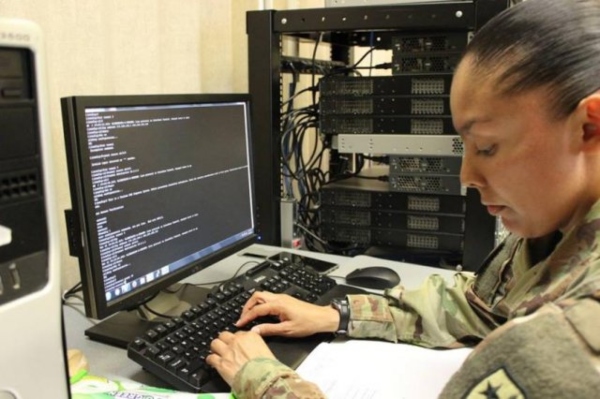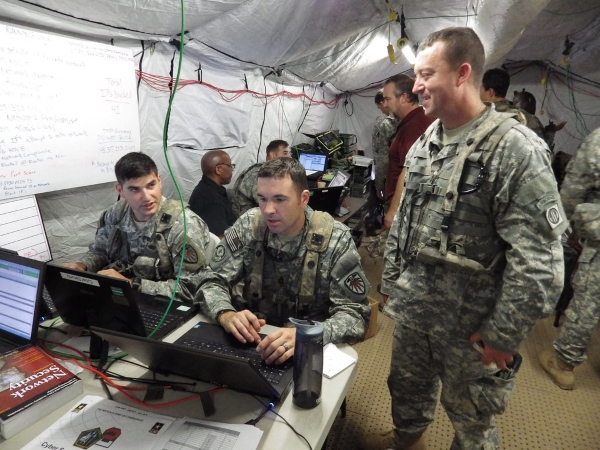Army Cyber Network Defenders (MOS 25D) perform specialized computer network defense duties.
An Army Cyber Network Defender protects and detects unauthorized activity in cyberspace.
Some of their work includes supporting infrastructure, providing incident response, as well as auditing and managing.
It is a computer/desk job that requires a fair amount of education and training.
Education, Qualifications, and Training

The role of a Cyber Network Defender (MOS 25D) is relatively new to the U.S. Army.
In fact, 25D MOS has only been around since 2013 when it was created as a military occupational specialty (MOS) to assist against the rising threat of cyber attacks.
What does it take to become an Army Cyber Network Defender?
Related Article – Army Infantryman (MOS 11B): Career Details
Education
The first step is to finish high school or receive a GED equivalent.
You cannot join the U.S. Army without one or the other.
Prospective Army Cyber Network Defenders must also perform well on the Armed Services Vocational Aptitude Battery (ASVAB).
You need to complete a score of:
- General Technical (GT): 105
- Skilled Technical (ST): 105
It is also worth mentioning that while a GED or high school diploma is all that is required to join the military, a prospective 25D MOS fares much better if they have some formal technical training, such as a vocational certificate or a two-year associate’s degree.
Those with a four-year computer-related degree may be eligible for commissioning as a Cyber Warfare Officer (17A).
Qualifications
It is not possible to become an Army Cyber Network Defender (MOS 25D) directly after enlistment.
Cyber Network Defenders are only considered with an Army rank of Staff Sergeant (E-6) or higher.
Additionally, the Army requires you to have at least four years of experience in Information Technology (IT) and Information Architecture (IA).
The experience must be verified by a personnel development officer.
Related Article – Air Force Cyber Warfare (1B4X1): Career Details
Thirdly, you will need to have a Top Secret security clearance in order to become MOS 25D.
Military background checks for security clearance are notoriously thorough and will involve examining your personal and financial history.
While not mandatory, the Army also recommends the following skills for an Army Cyber Network Defender (MOS 25D):
- Self-discipline, confidence, and intelligence.
- Physical and mental fitness to perform well under pressure.
- Attention to detail and ability to make quick decisions.
- Ability to stay focused and adhere to high ethical standards.
- Capability to bear numerous responsibilities and multi-task.
Training
Army Cyber Network Defenders (MOS 25D) are unlike most Military Occupational Specialties (MOS) in that you cannot become one directly after enlistment.
Those ultimately interested in a career in Cyber Network Defense may choose to start their Army career in a related MOS available to new recruits, such as Information Technology Specialist (25B)
So, after serving your time, progressing to the rank of E-6, and reaching other mandatory education and requirements of 25D MOS you can eventually reach job training.
Job training for an Army Cyber Network Defender is received at the USA Signal School at Fort Gordon, Georgia.
You will learn how to conduct offensive and defensive cyberspace operations at the USA Signal School.
Job training will also teach you how to analyze information and is a combination of classroom learning as well as time in the field.
What does an Army Cyber Network Defender Do?

MOS 25D Cyber Network Defender was added to the Army in 2013.
The position has evolved around the modern threats of cyber warfare and national security.
Army Cyber Network Defenders combat the threat of cyber attacks through computer networks.
Related Article – Army Horizontal Construction Engineer (MOS 12N): Career Details
Job Duties of MOS 25D
The number of job duties related to this very important role in the U.S. Army is lengthy.
We cannot possibly explain every job situation you will encounter, but here is a general idea:
- Responds to crisis or urgent situations within the network to mitigate immediate or potential cyber-attacks.
- Protect information systems and networks from threats.
- Conducts assessments of threats and vulnerabilities.
- Provides detailed analysis reports.
- Tests, implements, and deploys infrastructure software and hardware.
- Prepared to introduce mitigation, preparedness, as well as response and recovery approaches when necessary.
- Creates defensive measures and information collected from a variety of sources to identify, analyze, and report events that occur or potentially may occur in the future.
Part of your time in the Army may also include training and informing commanding officers or subordinate ranks on computer systems and cyber threats.
Related Article – Air Force Cyber Systems Operations (3D0X2): Career Profile
Knowledge and Expertise
You will gain the knowledge and expertise in the following computer systems through the role of a Cyber Network Defender (MOS 25D):
- Automated Information Systems (AIS) Security
- Computer Terminal Devices
- Networking Theory and Concepts
- Windows and UNIX Operating Systems
- Message Formatting for Telecommunications
- Processioning Incoming/Outgoing Messages
All in all, the primary objective of an Army Cyber Network Defender is to help create computer systems that can handle sensitive military data while withstanding external cyber threats.
What does an Army Cyber Network Defender make?

Army Cyber Network Defenders (MOS 25D) being at the pay level of E-6 (Staff Sergeant) since you must be at least this rank to work in the MOS.
Pay for a Cyber Network Defender ranges from $35,760 base pay per year for those with two or fewer years of experience and $55,390 for those with at least 18 years of experience.
Once you progress to more than 30 years of experience, having achieved a rank of E-8, you could earn over $84,000 per year as MOS 25D.
Keep in mind that this figure is base pay only. It does not include the generous housing and food allowance paid to most senior enlisted members who reside off-base.
| Insignia | Pay Grade | Rank | Abbreviation | Minimum Monthly Pay |
|---|---|---|---|---|
| E-1 +4 months | Private | PVT | $1,917.60 | |
| E-2 | Private Second Class | PV2 | $2,149.20 | |
| E-3 | Private First Class | PFC | $2,259.90 | |
| E-4 | Specialist | SPC | $2,503.50 | |
| E-4 | Corporal | CPL | $2,503.50 | |
| E-5 | Sergeant | SGT | $2,730.30 | |
| E-6 | Staff Sergeant | SSG | $2,980.50 | |
| E-7 | Sergeant First Class | SFC | $3,445.80 | |
| E-8 | Master Sergeant | MSG | $4,957.20 | |
| E-8 | First Sergeant | 1SG | $4,957.20 | |
| E-9 | Sergeant Major | SGM | $6,055.50 | |
| E-9 | Command Sergeant Major | CSM | $6,055.50 | |
| E-9 | Sergeant Major of the Army | SMA | $6,055.50 |
Together, pay is comparable to what you may earn in the private sector.
Though 2023 data has the median annual salary at $102,600 for Information Security Analysts (the closest civilian job equivalent to 25D MOS), the bottom 25 percent only pays $79,400 as a median.
BAH allowances for an E-6 service member in 2023 range from $11,000 to $61,650 per year, depending on the duty station and whether the service member has dependents.
BAS for enlisted members in 2023 is another $5,430 per year.
Neither BAH nor BAS are taxable income, so this is tax-free income added to your take-home pay.
This means that, depending on your Army rank and years of experience, your Army pay would easily equal or exceed that of similar jobs in the private sector.
It also does not include all the terrific benefits of being enlisted in the Army.
Benefits
The excellent benefits package of the U.S. Army includes:
- 30 days paid vacation time per year
- Special pay and reenlistment bonuses
- 100% medical and dental coverage
- Retirement pay
- Education: Army members can earn full tuition, merit-based scholarships, allowances for books and fees, plus an annual stipend for living expenses.
Job Reviews
Unfortunately, there are not any job reviews related to being an Army Cyber Network Defender (MOS 25D) on career sites like Indeed.com and GlassDoor.com.
Part of the reason is the MOS is very new (it was created in 2013), and most people still work in the military and are unable to disclose information about the top security clearance position.
Regardless, you can find numerous job reviews about Information Security Analysts and Computer Systems Analysts in the private sector by searching for them on career websites.
Related Article – Army Cyber Operations Specialist (MOS 17C): Career Details
Civilian Job Opportunities
Cyber Network Defender jobs are one of the fastest-growing careers in the United States.
According to the U.S. Bureau of Labor Statistics, opportunities for Information Security Analysts are expected to grow by 35% until 2031.
It is 4x better than the projected 7% job growth rate for all other occupations when rounded into a median.
Consequently, if you want to jump into a relatively new and exciting career with high growth potential, you should consider MOS 25D.
Those with direct job experience in the U.S. Army should have absolutely no problem finding civilian employment after leaving the military.
Summary
Cyber Network Defenders (MOS 25D) is one of the newer Military Occupational Specialties in the Army.
Though you cannot become 25D MOS directly after enlistment, it is a goal you should work for as you progress in military rank to Staff Sergeant (E-6).
The job outlook for Cyber Network Defenders is incredibly strong and you could earn six figures working as an Information Security Analyst, Computer Systems Analyst, or Computer and Information Systems Manager.
Related Article – 10 Best Army Jobs For Civilian Life
References:
- https://www.goarmy.com/careers-and-jobs/browse-career-and-job-categories/computers-and-technology/cyber-network-defender.html
- https://www.cool.army.mil/enlisted/25d.htm
- Replacing Dog Tags: 6 Things You Need to Know - June 28, 2024
- Navy OAR Test Study Guide - June 24, 2024
- 10 Best Sniper Movies of all Time - June 20, 2024
General FAQ
What is the Army 25 series MOS?
The 25 MOS series in the US Army belongs to the Signal Corps and consists of specialists in information technology, communications systems, network and cable systems, radio, satellite, and audio/visual equipment.
What is an Army 25D?
An Army Cyber Network Defender (MOS 25D) specializes in computer network security, monitoring and protecting against cyber attacks..
How long is AIT for MOS 25D?
Regardless of your background, the length of the curriculum for AIT for Cyber Network Defender (25D) is 3 1/2 months long.
What ASVAB score do you need for MOS 25D Cyber Security?
To become a 25D specialist, you need a minimum score of 105 on both the General Technical and Skilled Technical portions of the ASVAB.
What are the requirements to become an Army Cyber Network Defender, MOS 25D?
To work as a Cyber Network Defender for the US Army, you must be at least the rank of SSGT/E-6 and eligible for Top Secret/SCI (or currently hold one). Additionally, you need 4 years of experience in Information Technology and Information Architecture, however, this is waiverable.


On the FAQ portion of this site “How long is AIT for MOS 25D?” the length of 25D course is 3 and 1/2 months no matter what background you have. (I just finished the course 8 months ago).
On the FAQ portion of this site “What are the requirements to become an Army Cyber Network Defender, MOS 25D?” you must be at least the rank of SGT/E-5 and be eligible for Top Secret/SCI (not currently hold one), and it states you need 4 years of experience in Information Technology and Information Architecture, but this is wavierable.
Just updated the FAQ, I appreciate the heads up Marth!